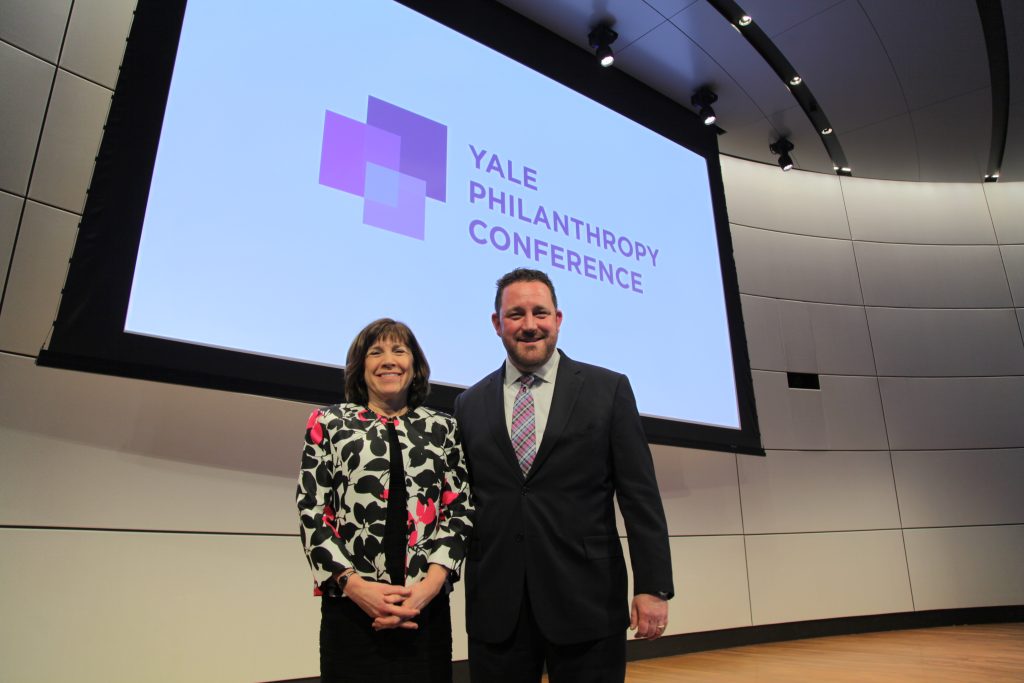
Asking the right questions: How philanthropy can make a difference in challenging times
NCRP president and CEO Aaron Dorfman delivered the closing keynote at the Yale Philanthropy Conference on February 23, 2018. Brief excerpts from his remarks are below. Text of the full speech can be found here. The slides are available here.
You are all here, we are all here, because we want to use our philanthropy to make the world a better place.
If we’re going to be successful in doing that, we have got to ask ourselves the right questions. These are challenging times in which we live. By asking ourselves the right questions, the hard questions, we can make a real difference with our philanthropy on issues that truly matter. I’m going to put forward five questions today that I think will help us be effective in these challenging times.
1. Are we dreaming big enough?
In his famous speech at the March on Washington, Rev. Dr. Martin Luther King, Jr. did not come forward and say, “I have a realistic plan with measurable outcomes and clear benchmarks.” No! He shared his dream.
The truth is: There are no limits to what philanthropy can accomplish in this world if we dream big and take risks.
“That’s ridiculous,” some of you may be thinking right now. “Philanthropic dollars are a drop in the bucket. The best we can hope to do is to fund effective programs and improve as many lives as we can.”
Let me tell you, that kind of small-ball thinking is horsepucky, and we need to abandon it if we want to truly transform and improve our nation and the world.
2. Are we doing enough to intentionally benefit and empower vulnerable and marginalized communities?
There is a moral reason to ask yourself this question and also a pragmatic one.
The moral argument is pretty obvious. Those who are fortunate have an obligation to give back, to help those who are not as fortunate. Every faith tradition has some version of this principle.
The pragmatic argument is that it works. With most ambitious philanthropic visions, you won’t be able to succeed in accomplishing your goals if you don’t intentionally benefit and empower underserved communities.

Prosperity Now President Andrea Levere and NCRP President and CEO Aaron Dorfman at Yale Philanthropy Conference 2018.
3. Is our privilege making us overly cautious?
Being privileged isn’t always an advantage in philanthropy. Your privilege can create blind spots, make you unnecessarily cautious and make it harder for you to achieve your goals.
Implicit bias, born of privilege, might make you not hire the best program officer. It might make you miss out on someone who would be a great new board member for your foundation. It might make you invest in the “proven, reliable” organization rather than in the smaller group led by people of color that you decide “doesn’t have the capacity” to do the work.
We see this all the time in our research at NCRP. Foundations aren’t investing the South, or in rural communities, or in communities of color, because they don’t think there is capacity there. But the truth is, there is a ton of capacity – but nonprofit capacity looks different in the South than it does here in the Acela corridor. Our privilege and our bias don’t let us see the full potential.
The good news is you can learn to compensate for your blind spots. Some of the most effective foundations do it successfully.
4. Are we giving in ways that promote the health, growth and effectiveness of our grantee partners and those they serve?
There are two essential things your grantees must have if they are going to maximize their effectiveness and impact. They have got to have sufficient unrestricted revenue, and they have to have long-term commitments.
Unrestricted general operating support allows grantees the flexibility to adapt to changing circumstances, or to invest in their own capacity.
Multi-year funding allows them to plan and to attract the best staff.
5. Are we wielding our power and all the tools at our disposal to build the world we envision?
Good philanthropy is about more than making grants. You must wield your power, too.
Yes, philanthropic funding is critically important to organizations. Yes, bold grants can catalyze transformative change. But, too many funders rely only on their grants to achieve impact, missing the opportunity to leverage the other tools at their disposal to advance their mission, values and goals.
Nonfinancial capital represents institutional and individual power that can be effectively used to influence others in order to achieve equitable, long-term change. Yet the idea of wielding power and influence can be difficult for foundations that pride themselves on being a “neutral convener.” Having a point of view that is well grounded and has moral integrity will enhance your institution’s credibility rather than tarnish it.
There are many ways foundations can exercise public leadership and wield their power responsibly and effectively.
Conclusion
These are urgent times we’re living in. It’s not hyperbole to say the future of our democracy and the planet are at stake. There is no time to waste.
We must never forget that there is no limit to what we can accomplish with good philanthropy.
And it’s going to take every one of us in this room doing our part to ensure that philanthropy plays a meaningful role in building a more fair, just and democratic society.
Aaron Dorfman is president and CEO of NCRP. Follow @NCRP on Twitter.
Photos courtesy of the Yale School of Management.